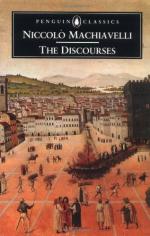
|
| Name: _________________________ | Period: ___________________ |
This quiz consists of 5 multiple choice and 5 short answer questions through Book One, The Development of Rome's Constitution, The Use and Abuse of Dictatorship, The Road to Ruin, Sundry Reflections Based on the Decemvirate.
Multiple Choice Questions
1. What is the branch of government that Machiavelli recognizes as that which most prevents or causes corruption to come over a city?
(a) The plebeian branch.
(b) The princes.
(c) The judicial (magistrates) branch.
(d) The legislative branch.
2. What are three reasons that Machiavelli gives for cities becoming unhappy?
(a) When cities are compelled to reorganize laws by themselves, when the laws diverge from their established institutions, and when the laws lead cities from the right path.
(b) When cities face armed challenges from outside institutions, the courts do not act justly, and when leaders abuse their power.
(c) When leaders drain resources to fight wars, when laws become tools for Princes to become more wealthy, when there is taxation without representation.
(d) When taxes drain Plebes of their wages, when resources are not allocated equitably, and when Princes seek to expand their influence with wars.
3. What does Machiavelli predict will come to Republics that do not provide for dictatorships or powerful authorities in times of urgent perils?
(a) A Republican government will always move in the benefit of everyone dependent on them.
(b) They will always be ruined in grave incidents.
(c) The trust leaders show in the people will inspire them to overcome the peril.
(d) The gathering of officials will paralyze the Republic in debate.
4. From what did Machiavelli develop the information that he wrote into "The Discourses"?
(a) From interviews with political thinkers of the day.
(b) From research that he did in the many libraries throughout the former Roman Empire.
(c) From his world travels to study governments in other cultures.
(d) From long experience and continuous study of worldly affairs.
5. According to Machiavelli, what caused the Roman Republic to form?
(a) Trade agreements between cities with resources and cities with technologies.
(b) Class warfare between the patricians and the plebes.
(c) Economic agreements between fertile cities.
(d) Political rivalries between powerful generals.
Short Answer Questions
1. What are two reasons Machiavelli gives for foreign forces building a city?
2. What is Machiavelli's explanation for initiating his recommended approach with enemies against an empire?
3. What does Machiavelli believe to the nature of men that causes them to either fight from ambition or from necessity?
4. What did Machiavelli establish as the cycle of governing forms?
5. What did Machiavelli suggest is the advantage of settling in areas that were "sterile" (barren)?
|
This section contains 669 words (approx. 3 pages at 300 words per page) |

|




